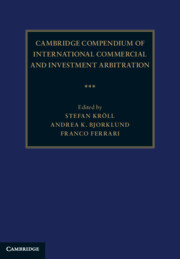Book contents
- Cambridge Compendium of International Commercial and Investment Arbitration
- Cambridge Compendium of International Commercial and Investment Arbitration
- Copyright page
- Contents
- Figures
- Tables
- Contributors
- Preface
- Part I Foundations
- 1 Arbitration as a Dispute Resolution Process: Historical Developments
- 2 Theories of International Arbitration
- 3 Limitations to Party Autonomy in International Arbitration
- 4 The Legal Framework of Arbitration: International and National Sources
- 5 Particularities of Investment Arbitration
- Part II Public Law Questions Relating to Arbitration
- Part III Stakeholders in Arbitration
- Part IV Applicable Law
- Part V Jurisdiction of the Arbitrator
- Part VI The Arbitral Tribunal
- Part VII Procedural Questions in Arbitration
- Part VIII Role of State Courts in Arbitration
- Part IX Awards
- Part X Post-Award Issues
- Part XI Legal Concepts
- Part XII Areas of Concern
- Part XIII Arbitration and Related Fields
- Part XIV EU Law and Arbitration
5 - Particularities of Investment Arbitration
from Part I - Foundations
Published online by Cambridge University Press: 18 February 2023
- Cambridge Compendium of International Commercial and Investment Arbitration
- Cambridge Compendium of International Commercial and Investment Arbitration
- Copyright page
- Contents
- Figures
- Tables
- Contributors
- Preface
- Part I Foundations
- 1 Arbitration as a Dispute Resolution Process: Historical Developments
- 2 Theories of International Arbitration
- 3 Limitations to Party Autonomy in International Arbitration
- 4 The Legal Framework of Arbitration: International and National Sources
- 5 Particularities of Investment Arbitration
- Part II Public Law Questions Relating to Arbitration
- Part III Stakeholders in Arbitration
- Part IV Applicable Law
- Part V Jurisdiction of the Arbitrator
- Part VI The Arbitral Tribunal
- Part VII Procedural Questions in Arbitration
- Part VIII Role of State Courts in Arbitration
- Part IX Awards
- Part X Post-Award Issues
- Part XI Legal Concepts
- Part XII Areas of Concern
- Part XIII Arbitration and Related Fields
- Part XIV EU Law and Arbitration
Summary
In this Compendium we have encouraged the authors to address both commercial and investment arbitration through the lens of their respective topics. This contribution highlights those areas in which investment arbitration has no or very little analogue with commercial arbitration. It sets out the incontrovertible fact that the state’s presence has certain ramifications.Investment treaty arbitration is ‘arbitration without privity’, in which a state has given its consent in advance to arbitrate a dispute submitted by an unknown (but defined) class of persons about an unknown (but defined) type of claim arising from an unknown (but defined) project. These uncertainties mean that objections to the jurisdiction and admissibility of claims are frequent, indeed almost de rigueur.The notion of applicable law in investment arbitration is complex, involving intersections between public international law and municipal law, between different public international law regimes, and even scrutiny as to whether investment tribunals can themselves develop law.State immunity can hinder the execution of awards. Because of the public interest in arbitral awards, transparency has come to be regarded (at least theoretically) as an essential attribute of investment arbitration. This chapter offers a smorgasbord of some of the most notable particularities of investment arbitration.
Keywords
- Type
- Chapter
- Information
- Publisher: Cambridge University PressPrint publication year: 2023



